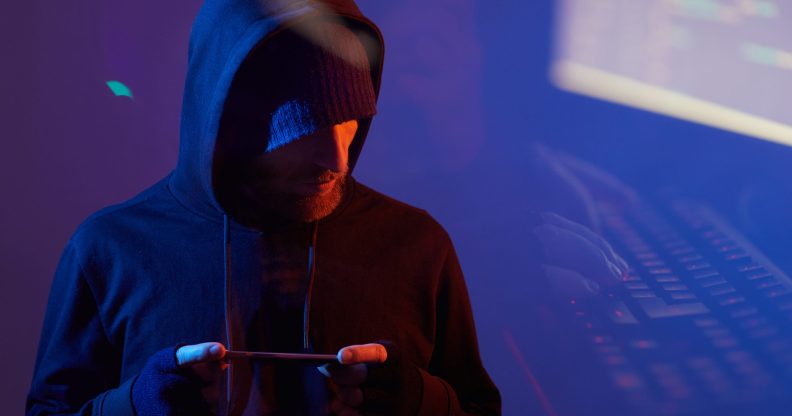While fighting anti-Muslim hatred, I decided to stand up up for LGBT+ rights. Homophobes targeted me with a smear campaign

Fiyaz Mughal was targeted by homophobes who used WhatsApp to avoid scrutiny. (Envato Elements)
Fiyaz Mughal, a former London councillor and founder of Faith Matters, writes for PinkNews about the threat of extremism, and how Islamic values and defending LGBT+ communities are not contradictory.
A core founding principle of leading organisations that tackle hatred and bigotry, is to ensure that these organisations hold up and stand firm against any form of bigotry, whether that emanates from within a certain community or within a wider population setting.
With this laudable principle in mind, I developed and formed Tell MAMA in 2011, to map, monitor and measure anti-Muslim hatred in the UK. Central to the work was also ensuring safety and access to justice for victims of anti-Muslim hatred.
During my five-year tenure leading this nationally recognised project, it became clear that there was a small, vocal and hardened group of co-religionist activists, loosely supportive of groups who sought to use inflammatory content about “Muslims being under attack”, the Middle East conflict and Islamophobia to build their support base within British Muslim communities.
Their actions were a wake-up call to the malicious and bigoted nature of some of the activists who rightly challenged anti-Muslim bigotry, but who were central to campaigns promoting toxic homophobia, as well as anti-semitism, through WhatsApp and other mobile networks.
Their use of WhatsApp was a method by which they could try to reduce any online imprints of their hatred, just in case they were publicly held to account for it.
In 2014, I stood with the formidable and iconic LGBT+ rights activist, Peter Tatchell, against homophobia and which led to a torrent of hatred and abuse against my colleagues and I in Tell MAMA.
Little did I know that it would form the basis of large scale WhatsApp campaigns, sent out by co-religionists to mosques and Islamic institutions in the Greater Manchester and Leicester areas.
These were targeted and well-organised campaigns by activists who were associated with groups active in this area, and who used “fake news” links to Islamist opinion sites to suggest that I was “promoting” homosexuality and, therefore, paedophilia. All this in the perverse hope that they could spread fear and bile about LGBT+ communities, into parts of Muslim communities who had little engagement with them.
It’s as though tackling homophobia was a grave sin against Islam.
I remember individuals within Muslim communities who knew about my work, sending me the WhatsApp messages, aghast at the smear tactics used by Islamists and these “fake news” fakirs.
This campaign came to symbolise a deeper malaise that had taken root in some young people – the claim that their rights for equality superseded the rights of others whom they deemed as “untermenschen” (a Nazi term meaning subhuman), simply because of their sexuality.
It was as though the task of tackling Islamophobia in their minds was underpinned by a scaffolding built on homophobia and some of the most egregious tropes against LGBT+ communities in our country.
What was also startling was how serious thought had been given to constructing the messages, their language and the emotional buttons that they sought to press within recipients in British Muslim communities.
The appalling line that these well-organised campaigns were pushing was that it was Islamic to be homophobic, and that gay people had paedophilic tendencies.
One of the messages linked gay communities to paedophilia, then asked recipients to keep away from me since I was “trying to change Islam”, as though tackling homophobia was a grave sin against Islam.
Another falsely represented Tatchell by saying that he hated Islam (he was holding a banner against the fundamentalism within a Hizb-ut-Tahrir conference).
The conditions for extremism have been here for decades, and the threat remains today.
I raise this event today, since by chance, a month ago, I came across one of the tweets from an organisation that served as a flame to the hate-mongering moths that I have described.
The tweet was couched in the language of human rights, a tactic that some Islamist groups have adopted in our country in an effort to rebrand themselves, without any re-evaluation of their core values.
I have worked for decades in countering extremism and was one of the few who were still active in this field from the 7/7 groups of advisors that the then-prime minister Tony Blair put together after the London bombings.
Countless papers on extremism have been written and group after group purports to shine a light on the activities of extremists.
Much of this work is extremely valuable but it has become narrow, blinkered and unwilling to say what is obvious: that the conditions for extremism have been around for decades in our country and that a triad of extreme social values, linked to grievances and trigger factors created the perfect storm.
Many of these extreme social values were regarded as “culture” and just what certain communities did. Comments like this, allowed many to disregard what they saw or heard.
Yet, to this day, there has really been no challenge to the fake news fakirs and peddlers of hate. “If it is not illegal, there is little we can do,” has been the statement I have heard time and time again from social media and government sources.
So long as such activists and groups continue to undermine the social values that make up the fabric of our country, the threat of extremism will remain.
As someone who sees no contradiction in defending LGBT+ communities against hate and core Islamic values, I fear that I may well be in a minority in a growingly polarised world.
The question really is, how long before the haters infect hundreds of thousands in this country with their warped form of religious interpretations?

